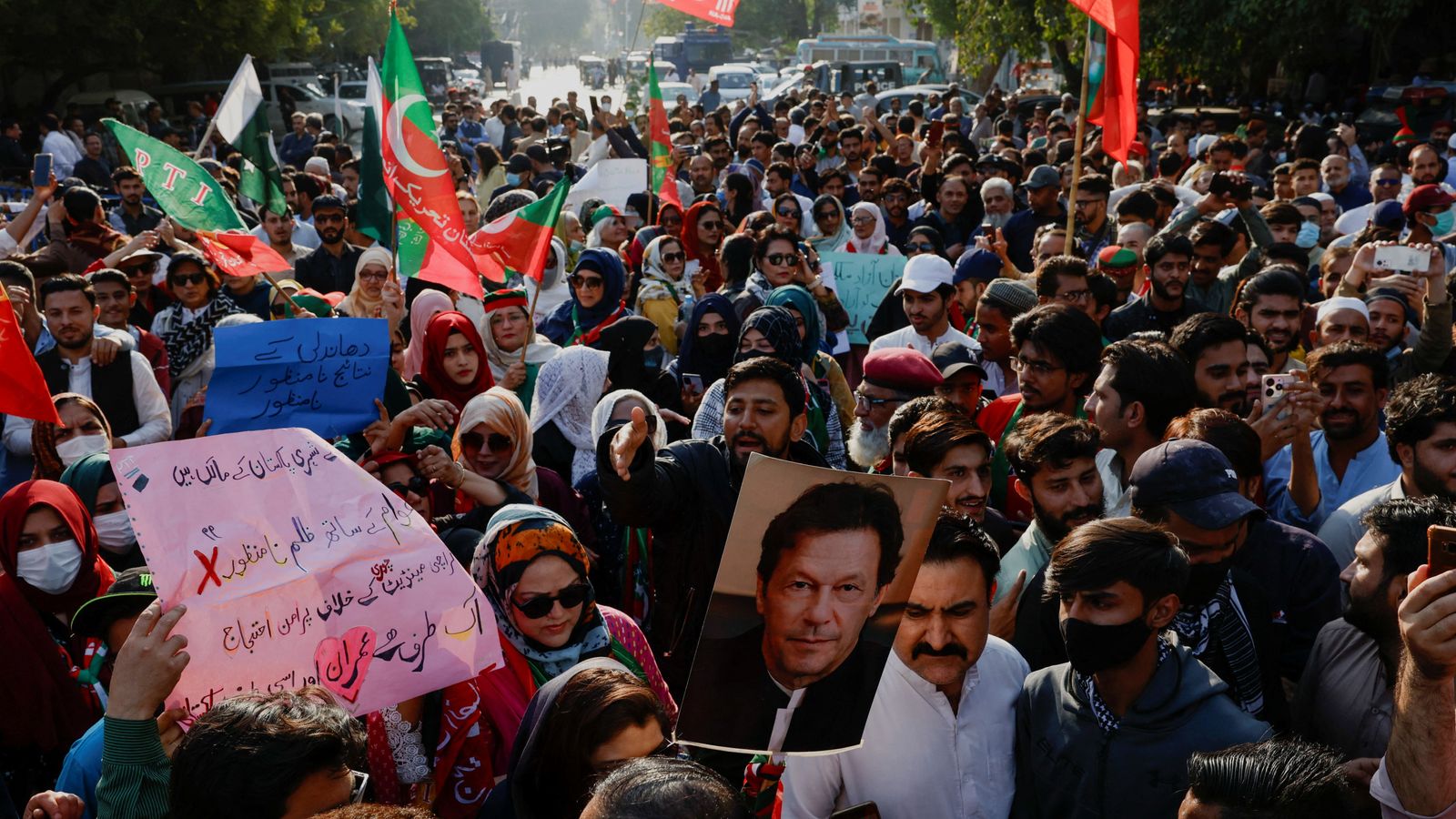The final results of Pakistan’s election have put independents, who mostly support jailed former prime minister Imran Khan, in the lead with 93 of 264 seats.
The Pakistan Muslim League (PML) of Nawaz Sharif, another former prime minister, was in second place with 75 seats after Thursday’s vote.
The 74-year-old lacks a clear majority but the PML has emerged as the largest single party in parliament as Mr Khan’s independents ran as individuals.
Mr Sharif and Mr Khan – a former Pakistan cricket captain and a legend of the sport – have both declared victory as it remains unclear who will form a government.
Mr Khan is in prison for convictions on charges ranging from leaking state secrets to corruption, but his supporters insist the charges are politically motivated.
Millions came out to vote for independents aligned with Mr Khan even though he cannot be part of any government while he remains in prison.
Mr Khan’s sister Aleema told Sky News that Mr Sharif’s claim of election victory is an “insult to Pakistanis”.
Middle East latest: US missiles down five targets off Yemen; Hamas says Israeli strikes have killed two hostages in Gaza | War latest
Israel warned of repercussions if it launches ground invasion in Rafah
Why warnings from Iraq’s powerful armed groups bode badly for the Middle East’s stability
Read more:
Pakistan in political limbo after election upset – so what’s next?
Khan uses AI video to claim victory in Pakistan election
Please use Chrome browser for a more accessible video player
A prime ministerial candidate has to show a simple majority of 169 seats in the National Assembly in order to form a government when the house is called in the coming days.
This will be determined by coalition talks and whether Khan-backed candidates are able to join a smaller party in parliament to form a single bloc to gain reserve seats.
Protesters have blocked roads as coalition talks have been held in the north of the country.
The political uncertainty is adding to instability in a country facing numerous urgent challenges, including negotiating a new International Monetary Fund programme to keep a struggling economy afloat.
The final tally of votes was published by the election commission more than 60 hours after voting ended, raising questions over the delay.
Mr Khan’s Pakistan Tehreek-e-Insaf (PTI) had threatened to hold nationwide peaceful demonstrations on Sunday if the vote tally was not released overnight.
While a large-scale protest was called off, a police source and motorists said hundreds of PTI supporters had blocked traffic in the northern city of Peshawar.
Pakistan’s interim government said the voting count delay was caused by communications issues due to a mobile internet outage on election day.
The outage, which authorities said was for security reasons, drew concern from human rights groups and foreign governments, including the United States.
In a post on social media platform X on Sunday, a PTI party secretary said there should be demonstrations at certain electoral offices where they were concerned about “forged” results.
About 93 of the independent candidates who won seats were associated with Mr Khan’s PTI party.
Mr Khan’s supporters ran as independents because they were barred by the election commission on technical grounds from contesting the polls under his party’s electoral symbol.
One disadvantage the independents face in trying to form a government is that they, having not run as a party, are not eligible to be allocated any of parliament’s 70 reserved seats, which are distributed according to party strength in the final tally.
Mr Sharif’s party could get up to 20 of these seats.
A spokeswoman for Mr Sharif’s party said that he had met with representatives of the minority regional Muttahida Qaumi Movement (MQM) party and they had agreed to “in principle work jointly in the larger interest of the country”.
An MQM leader confirmed the meeting but said no formal coalition agreement had been made.
The election commission previously flagged that results for two seats could not yet be included, one in which a candidate was killed, requiring the postponement of polling, and another in which polling would be completed later this month.
Forming a government could take weeks as Mr Sharif and his team try to court independents and Pakistan People’s Party (PPP) candidates to help form a government.
Some 30 seats in the election were taken by the PPP, whose leader is Bilawal Bhutto Zardari, the son of assassinated premier Benazir Bhutto.
Mr Bhutto Zardari could end being kingmaker in the election – with observers saying he may end up in a coalition with Mr Sharif.











